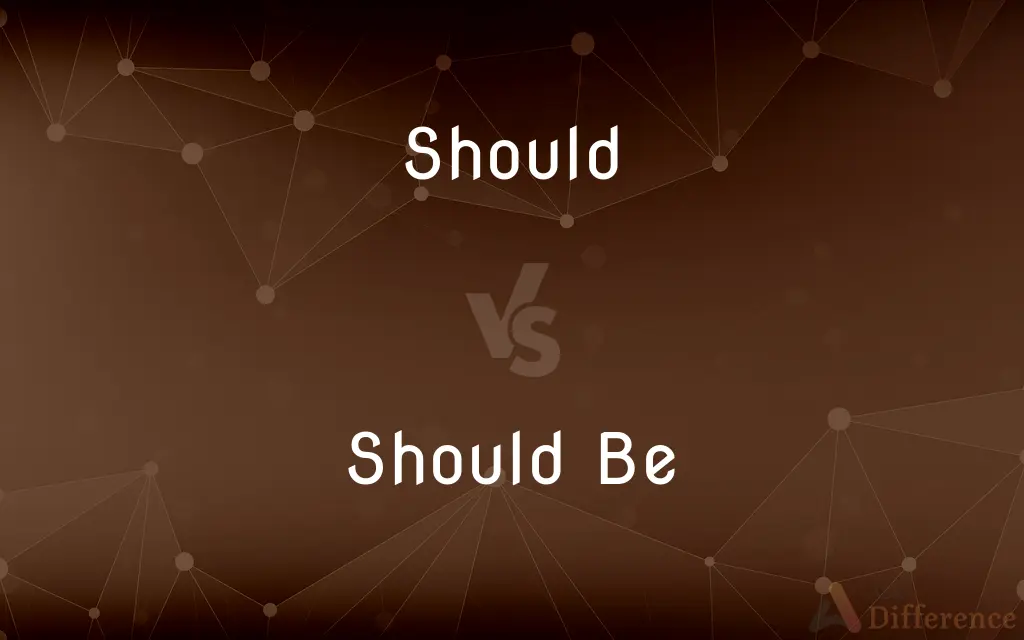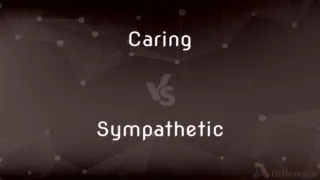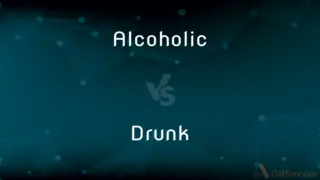Should vs. Should Be — What's the Difference?
By Tayyaba Rehman — Published on October 12, 2023
"Should" expresses obligation or correctness, while "Should Be" implies what is expected or supposed to be in a certain state.

Difference Between Should and Should Be
Table of Contents
ADVERTISEMENT
Key Differences
"Should" is a modal verb utilized to indicate obligation, duty, or correctness, often when giving advice. On the contrary, "Should Be" incorporates a state of being into the obligation, suggesting a particular condition or status that is expected.
“Should” guides the course of action that is deemed correct or recommended in situations. In contrast, “Should Be” introduces a nuanced expectation of a specific situation or condition being in a particular state or manner.
Employing "Should" generally leads to advice, recommendations, or hints at the right course of action in sentences. Alternatively, “Should Be” extends this by incorporating a predicted or expected condition, describing how things ought to be.
While "Should" focuses primarily on the action or task that is considered proper or necessary, "Should Be" diverges slightly by blending this necessity with an expected status or condition, adding a layer of supposition.
The application of "Should" provides a base for suggesting what is proper or right, functioning as a guide toward moral, logical, or desirable actions. Conversely, “Should Be” intertwines this guidance with a projected or anticipated condition, blending obligation and expectation.
ADVERTISEMENT
Comparison Chart
Usage
Modal verb
Modal verb + verb to be
Expression
Indicates obligation or advice
Indicates expected condition/state
Example
You should go.
You should be here.
Function
Directs or advises actions
Directs to a supposed state
Formation
Is not followed by “to be”
Is always followed by a state/verb
Compare with Definitions
Should
"Should" demonstrates advisability.
You should wear a hat in the sun.
Should Be
"Should Be" presupposes a condition.
The keys should be on the table.
Should
"Should" expresses obligation or duty.
You should apologize.
Should Be
"Should Be" implies an expected state.
She should be at work now.
Should
"Should" can indicate a conditional situation.
If you should see them, say hello.
Should Be
"Should Be" indicates a probable condition.
It should be raining soon.
Should
"Should" indicates a likely event or condition.
He should arrive soon.
Should Be
"Should Be" suggests an advisable state.
You should be more careful.
Should
"Should" describes a probable condition.
It should be warm tomorrow.
Should Be
"Should Be" blends obligation with expectation.
This should be the right answer.
Should
(auxiliary) Ought to; indicating opinion, advice, or instruction, about what is required or desirable.
Should
Used to issue an instruction (traditionally seen as carrying less force of authority than alternatives such as 'shall' or 'must').
You should never drink and drive.
The law is clear that you should always wear a seat belt.
The manual says that this switch should be in the 'off' position.
Should
Used to give advice or opinion that an action is, or would have been, beneficial or desirable.
You should go and see that film. I think you'll enjoy it.
I should exercise more often, but I’m too lazy.
She should not have been so rude.
Should
(informal) With verbs such as 'see' or 'hear', usually in the second person, used to point out something remarkable in either a good or bad way.
You should see his new apartment. It's like a palace!
If you think her piano playing is bad, you should hear her sing!
Should
In questions, asks what is correct, proper, desirable, etc.
What do you think? What should I do?
Should
(auxiliary) Ought to; expressing expectation.
Should
Indicates that something is expected to have happened or to be the case now.
They should have finished by now; I'll call them to check.
My fruit trees should be in flower, but the cold spring has set them back.
Should
Will be likely to (become or do something); indicates a degree of possibility or probability that the stated thing will happen or be true in the future.
They should have it finished by Friday.
When you press this button, the pilot flame should ignite.
You should be warm enough with that coat.
Should
Used to form a variant of the present subjunctive, expressing a state or action that is hypothetical, potential, mandated, etc.
If I should be late, go without me.
Should you need extra blankets, you will find them in the closet.
The man demanded that he should be allowed entry.
I'm surprised that he should say that.
Should
(auxiliary) cap=1.
I told him that I should be busy tomorrow.
Should
(auxiliary) An alternative to would with first person subjects.
Should
Used to express a conditional outcome.
If I had not been so tired, I should have laughed heartily.
Should
Used to impart a tentative, conjectural or polite nuance.
I should imagine that they have arrived by now.
I should think you would apologize.
Should
Used to express what the speaker would do in another person's situation, as a means of giving a suggestion or recommendation.
It's disgraceful the way that they've treated you. I should write and complain.
Should
To make a statement of what ought to be true, as opposed to reality. en
Should
Something that ought to be the case as opposed to already being the case.
Should
Used as an auxiliary verb, to express a conditional or contingent act or state, or as a supposition of an actual fact; also, to express moral obligation (see Shall); e. g.: they should have come last week; if I should go; I should think you could go.
Common Curiosities
Can “Should” express future probability?
Yes, "Should" can express something that is likely in the future.
Can "Should" indicate a recommendation?
Yes, "Should" can be used to indicate advice or recommendations.
How does "Should Be" relate to a current state?
"Should Be" ties an expectation or obligation to a particular state or condition.
Does "Should Be" imply correctness?
Yes, "Should Be" implies a condition or state that is supposed to be correct.
How does "Should" function in conditional sentences?
In conditionals, "Should" expresses a possible future event that might occur.
How is "Should" used in a sentence?
"Should" is used to express obligation, advisability, or probability.
What does "Should Be" express?
"Should Be" expresses an expectation or supposition about a state or condition.
Can "Should Be" reflect a desired state?
Yes, "Should Be" can indicate a state that is desired or supposed to be true.
Is "Should" used for giving advice?
Yes, "Should" is commonly used to provide advice or suggestions.
Share Your Discovery

Previous Comparison
Caring vs. Sympathetic
Next Comparison
Alcoholic vs. DrunkAuthor Spotlight
Written by
Tayyaba RehmanTayyaba Rehman is a distinguished writer, currently serving as a primary contributor to askdifference.com. As a researcher in semantics and etymology, Tayyaba's passion for the complexity of languages and their distinctions has found a perfect home on the platform. Tayyaba delves into the intricacies of language, distinguishing between commonly confused words and phrases, thereby providing clarity for readers worldwide.














































